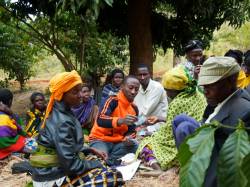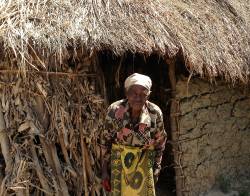 The Kwa Wazee pension scheme, established in 2003, reaches 1,100 older-headed households in six wards of Muleba District in North-western Tanzania. The scheme provides selected pensioners with a cash transfer of 12,000TZS (7.50USD) a month, with an additional 7,000TZS (4.30USD) per child, provided for those that care for grandchildren.
The Kwa Wazee pension scheme, established in 2003, reaches 1,100 older-headed households in six wards of Muleba District in North-western Tanzania. The scheme provides selected pensioners with a cash transfer of 12,000TZS (7.50USD) a month, with an additional 7,000TZS (4.30USD) per child, provided for those that care for grandchildren.
While the multidimensional impact of the scheme is well documented, a forthcoming study, focusing on Ngenge ward, the remotest of the six wards where Kwa Wazee is implemented, aims to explore three vital questions:
1. What are the livelihood-realities of older people living in Ngenge?
2. What are the experiences of Kwa Wazee in the implementation of the pension scheme? How is the pension delivered and how well does it work?
3. What would be the challenges and opportunities for a national pension programme in comparable settings?
In this blog Mandy Heslop and Stefan Hofmann explore some of the findings of this research, which draws on inter-households surveys carried out in 184 older-headed households in Ngenge ward in April, 2013.
Livelihoods
The vast majority of older people rely on small plots of land surrounding their homes to grow food for their households or, occasionally, to sell. While data is still being analysed, a number of preliminary findings indicate aspects of vulnerability of these households. On average, 53.5 per cent of all spending was on food, with expenditure on non-food and other household items averaging 20 per cent. The purchase of day labour for subsistence farming was the most common investment spending, amounting to 9 per cent.
Pensions and child benefits were an important source of income for households. On average these benefits made up 38 per cent of all income, although in some households this figure was more than 80 per cent. Sale of agricultural products was the next most important income (34 per cent). Survey households represented a wide range of spending and income brackets, and data will be compared by sex of household head and by household location in more and less remote areas.
Health care
Interviews with pensioners highlighted common conditions of poor physical mobility, failing eye-sight and other non-communicable diseases. Many pensioners reported difficulty accessing care and treatment. Long distances to the nearest hospital require hours of walking or unaffordable transport fees. The high cost of treatment is exacerbated for those responsible for children and those who have very little income besides the pension Older people in Tanzania are entitled to free or discounted care from government run health centres, however, there was little evidence of interviewees being able to access this.
Delivery of cash transfers
The Kwa Wazee pension is paid monthly via local pay-points. Pensioners have the option of collecting the pension themselves or nominating a neighbour or relative to collect it on their behalf.
Trust
Pensioners, community leaders and informants expressed unreserved trust in pension delivery, describing performance at pay-points as effective, reliable and timely.
Mobility and access
Given the remoteness of Ngenge and the difficulties facing its pensioners, the option to nominate a proxy to collect the pension is vital. Observations and records at one pay-point during the study demonstrated that, of a total of 80 pensioners, only 40 collected for themselves, 28 pensions were collected by nominated persons, 11 were delivered to the pensioners at home by a volunteer committee member, and one pensioner stayed away without notice.
Targeting
The limited budget of the programme inevitably requires a selection process for beneficiaries. Several targeting methods have been applied over the years, none of them entirely satisfactory. Widespread poverty, as found in Ngenge, is bound to reveal shortcomings and inconsistences in the implementation of targeting. With so many vulnerable older people excluded, the great acceptance of Kwa Wazee’s programme found in Ngenge is an achievement, however, the overall experience clearly supports a universal pension.
Comprehensive approach
In addition to delivering pensions and child benefits, Kwa Wazee promotes mutual support groups for older people and vulnerable children, as well as health and advocacy initiatives. Case studies within our forthcoming paper will demonstrate how the impact of the cash transfers can be greatly enhanced by this complementary approach.
Towards a universal pension
In recent years, debate around universal pensions has been growing in Tanzania. By looking at delivery of the Kwa Wazee pension in Ngenge, we hope to draw lessons to inform the design of a national level pension.
Identification
The study questionnaire found that most older people possessed either voting passes or (for Christians) Baptism cards, recording their date of birth. With the addition of village level registers, age identification should be possible for the majority of older persons. For a minority without records, practical methods of age identification will be required.
Access
The questionnaire will also provide information on mobility and health related barriers that will need to be taken into account when considering methods of pension delivery.
Transparency and reliability
Ambivalence was expressed about the capacity of government institutions to deliver services. Drawing on experiences of poor delivery of food aid and the promised exemptions of health costs, older people expressed doubts that all their pensions would reach them. However, village leaders and older people agreed that: cash transfers should be as direct as possible from source to pensioner, older people should be included in design and implementation, and that there is the need for adequate monitoring and grievance structures.
New technology
Questionnaire and village profile information will confirm that remote areas are disadvantaged in relation to use of technology such as cash transfers through mobile phones (such as M-PESA). However, there are signs that use is growing even in the research area and that there are grounds for expecting that increased demand could fill such gaps. A number of older people, including those with poor sight and limited literacy, will rely on assistance to use new technology, but support will always be needed for some pensioners regardless of transfer method.
Universality
There was widespread understanding of and support for a universal pension. Pensioners expressed uneasiness about their own selection for a pension in the context in which all older people are vulnerable.
Read More
Read more about Kwa Wazee and the impact that it has had.
The research report, when finalised, will be available on the Kwa Wazee website and the Pension Watch Knowledge Centre.

